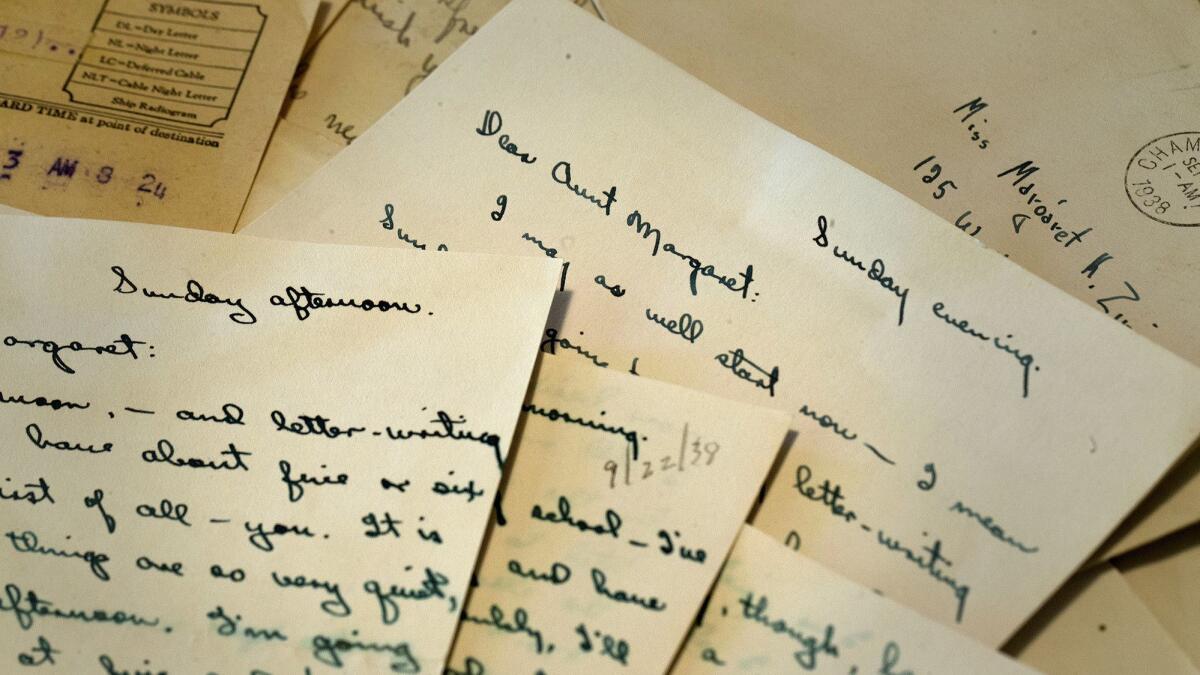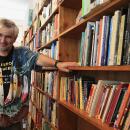Op-Ed: Check that shoe box full of your family letters. There are keepers that can fill in L.A.’s history

What piece of paper made an Angeleno out of you? Did your grandfather write a letter home to his sweetheart, telling her he’d found work and wanted to make a life with her here?
Where has your life intersected with the city’s? Did you write in your diary on the night of the Northridge earthquake, between sips of Red Cross coffee?
Every day, dumpster-loads of journal entries and letters home like these — sidewise glimpses of the city and the lives lived in it — are backhoed into landfills. We need a way to preserve the best of this written ephemera. I know because I’ve spent seven years digging through what’s survived so far — in libraries and archives, on blogs and tucked away in people’s closets — for a new book of Southern California popular history.
Every day, dumpster-loads of journal entries and letters home — sidewise glimpses of the city and the lives lived in it — are backhoed into landfills.
Now I’m proposing that we think twice before mulching these documents into oblivion — and do a little civic archiving first.
My inspiration is the groundbreaking, nationally influential Los Angeles Public Library initiative“Shades of L.A.” Devised by the great Angeleno and photo librarian Carolyn Kozo Cole, who died Dec. 6, the project began in 1991. The city’s branch libraries declared neighborhood “photo days,” inviting people to bring in their family picture albums and duplicating the most significant snapshots on the spot. Librarians and volunteers took down relevant donor information and then cataloged the photographs for LAPL’s permanent collection, augmenting and enriching the newspaper and real-estate photo archives the library already held.
The proposed new project would shift the focus from pictures to words. On designated “diary days,” libraries and archives — public, private and academic — would set volunteers to work copying a selected page or two from local family journals and letters. Ideally, they’d have some bearing on the city’s life as well as the writer’s. The collection that would result, tagged and searchable, could create an every man’s diary available for posterity, a database that doubles as a city treasure.
Of course, data collection has changed a lot since 1991. Now Angelenos could just snap photos of a quintessential L.A. page and forward it to an agreed-upon library address. But something would be lost without occasional public diary days too, when convivial strangers could meet up and swap stories.
Such a grand data dump would require pre-editing from the donors. Librarians are overworked enough without sorting through old litanies of our petty aches and pains.
Nevertheless, a project like this one would gather a bounty of lore about the widest possible range of Angelenos, people whom official sources — newspapers, books, even well-intentioned scholarship — have too often overlooked. Library exhibits might eventually display some of the more fascinating originals. A couple of gorgeous books grew out of the old “Shades of L.A.” project, and that could happen here too, but the real goal would be democratizing and refining a history of L.A.
Back in the 1990s, I pitched in as a part-time volunteer on “Shades of L.A.” Boy, was I lousy at it. I never mastered the photo equipment, and, stupid kid, I copied pictures of too many movie premieres and not nearly enough quinceañeras. The library already had lots of the former. Neighborhood birthday parties, sadly not so much.
I’ve never forgotten one photo that an older woman from South L.A. brought in. It showed a nighttime, open-car parade for Duke Ellington, smiling and waving to the crowd as he cruised past the Lincoln Theater on Central Avenue. I imagined he was about to lead the orchestra in “California Mello,” a track I love that he recorded only once.
Not only have I never forgotten that photo, it appears that I’ve never remembered it accurately either. I just now I googled it at the library’s website. Turns out it was Lionel Hampton, not Duke Ellington. It was the Club Alabam, not the Lincoln Theater. Maybe he played “California Mello,” maybe he played “Mellow Yellow.” In other words, we need the documentation that only mindful archiving can provide. Memory isn’t enough.
The other night I was talking about my diaries-and-letters book at Vroman’s, and a guy in the audience asked question that I should’ve been ready for: What diary or letter do I wish I had in the book but don’t?
Enter the Fray: First takes on the news of the minute from L.A. Times Opinion »
I vamped awhile, but eventually I came up with an answer. I said that my Aunt Esther hung on to the letters my late father sent home to the States from World War II. Born in France and raised in the Midwest, he wrote about the helplessness he felt as a young surgeon walking into a concentration camp. He wrote, too, about arriving in Paris after D-day and liberating his own relatives.
They’re good letters, even in a doctor’s handwriting. But after he got demobbed and moved here, the verbal trail goes dead. I don’t have the stuff he wrote describing Los Angeles to the folks back home in Wisconsin, the letters about the L.A. Doctors Symphony concerts at Philharmonic Auditorium, about book-browsing in Westwood Village — the kind of details Hemingway prized as “the people and the places and how the weather was.” That’s lost.
Oh man, I wish I had that stuff. There have to be tens of thousands of letters and diaries just as vivid out there, moldering in shoe boxes all over Southern California. They’re hidden among duds, naturally — the dull to-do lists and appointment calendars. But at least once in every box, I swear there’d be a keeper, a scrap that suddenly illuminates the city, the writer, the times. We should save them from the backhoe’s claw.
David Kipen is the founder and director of the nonprofit Libros Schmibros Lending Library in Boyle Heights. His latest book is “Dear Los Angeles: The City in Diaries and Letters, 1542 to 2018.”
Follow the Opinion section on Twitter @latimesopinionand Facebook
More to Read
A cure for the common opinion
Get thought-provoking perspectives with our weekly newsletter.
You may occasionally receive promotional content from the Los Angeles Times.











